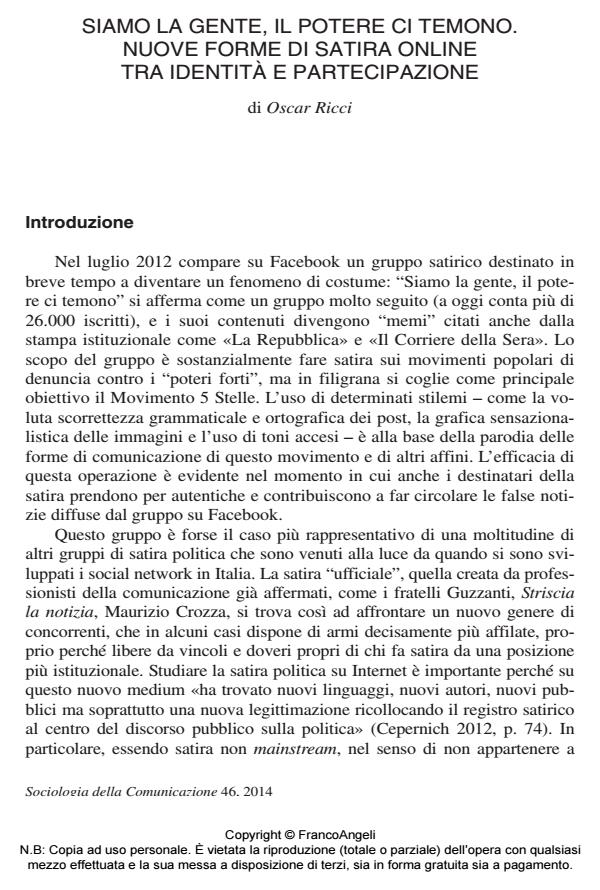Identity and Participation
Journal title SOCIOLOGIA DELLA COMUNICAZIONE
Author/s Oscar Ricci
Publishing Year 2014 Issue 2013/46
Language Italian Pages 21 P. 74-94 File size 2126 KB
DOI 10.3280/SC2013-046006
DOI is like a bar code for intellectual property: to have more infomation
click here
Below, you can see the article first page
If you want to buy this article in PDF format, you can do it, following the instructions to buy download credits

FrancoAngeli is member of Publishers International Linking Association, Inc (PILA), a not-for-profit association which run the CrossRef service enabling links to and from online scholarly content.
This article presents the results of a qualitative analysis, conducted through discourse analysis and semi structured interviews, of several groups of political satire on Facebook, some concentrated particularly in criticizing the five-star movement. The results show how the specificity of these groups is to have built a critique from the web of a popular movement that originates and develops from the web itself. The interviews show how behind a conflict on political themes there is a deep critique on the use and the very nature of the web.
Keywords: Political satire, political partecipation, web studies, trolling, Movimento 5 Stelle, Internet culture.
- Danna S. (2013), L’uso di internet (a bassa tecnologia) del movimento cinque stelle, «Il Corriere della Sera», 6 marzo.
- Day A. (2011), Satire and Dissent. Interventions in Contemporary Political Debate, Indiana University, Bloomington-Indianapolis.
- Cepernich C. (2012), La satira politica al tempo di internet, «Comunicazione politica », 1, pp. 73-88.
- Coleman S. (2003), A Tale of Two Houses, Hansard Society, London.
- Altheide D. L. (1996), Qualitative Media Analysis, Sage, Thousand Oaks.
- Barisione M. (2009), Comunicazione e società, il Mulino, Bologna.
- Battista P. (2013), Dall’aids ai chip sottopelle. I complotti finiti nella rete a cinque stelle, «Il Corriere della Sera», 8 marzo.
- Bell A., Garrett P. (a cura di) (1998), Approaches to Media Discourse, Blackwell, Oxford.
- Benvenuti G. (2006), Le teorie del complotto tra realtà e finzione letteraria. Il caso del Codice Da Vinci, «Studi Culturali», 3, 1, pp. 133-145.
- Boccia Artieri G. (2012), Stati di connessione. Pubblici, cittadini e consumatori nella (Social) Network Society, FrancoAngeli, Milano.
- Bourdieu P. (1982), Ce que parler veut dire. L’économie des échanges linguistiques, Fayard, Paris; trad. it. La parola e il potere, Guida, Napoli, 1988.
- Fairclough N. (1995), Media Discourse, Edward Arnold, London.
- Formenti C. (2008), Cybersoviet. Utopie postdemocratiche e nuovi media, Cortina, Milano.
- Ginzburg C. (1991), Il giudice e lo storico. Considerazioni in margine al processo Sofri, Einaudi, Torino.
- Gustafsson N. (2012), The Subtle Nature of Facebook Politics: Swedish Social Network Site Users and Political Participation, «New Media and Society», 14(7), pp. 1111-1127.
- Himanen P. (2001), L’etica hacker e lo spirito dell’età dell’informazione, Feltrinelli, Milano.
- Hine C. (2000), Virtual Ethnography, Sage, London.
- Lenardon M. (2013), Come Grillo e Casaleggio hanno trasformato Internet in Rete quattro, «Vice», www.vice.com/it/read/grillo-m5s-casaleggio-internet.
- Liff S., Shepherd A. (2004), An Evolving Gender Digital Divide?, Internet Issue Brief n. 2, Oxford Internet Institute, Oxford, luglio, www.oii.ox.ac.uk.
- Östman J. (2012), Information, Expression, Participation: How Involvement in User-generated Content Relates to Democratic Engagement among Young People, «New Media and Society», 14(6), pp. 1004-1021.
- Ricci O. (2012), Recensione a “Satire and Dissent. Interventions in Contemporary Political Debate”, «Comunicazione politica», 1, p. 149.
- Scheufele D. A. (1999), Framing as a Theory of Media Effects, «Journal of Communication », 49, 1. Tosoni S. (a cura di) (2011), Nuovi media e ricerca empirica, Vita & Pensiero, Milano.
- Velasquez A. (2012), Social Media and Online Political Discussion: The Effect of Cues and Information Cascades on Participation in Online Political Communities, «New Media and Society», 14(8), pp. 1286-1303.
- Wilson J. (2011), Playing with Politics: Political Fans and Twitter Faking in Postbroadcast Democracy, «Convergence: The International Journal of Research into New Media Technologies», 17(4), pp. 445-461.
- Young S. (2010), How Australia Decide: Elections Reporting and the Media, Cambridge University Press, Port Melbourne.
Oscar Ricci, Siamo la gente, il potere ci temono. Nuove forme di satira online tra identità e partecipazione in "SOCIOLOGIA DELLA COMUNICAZIONE " 46/2013, pp 74-94, DOI: 10.3280/SC2013-046006